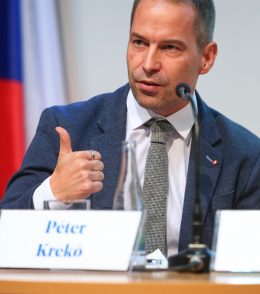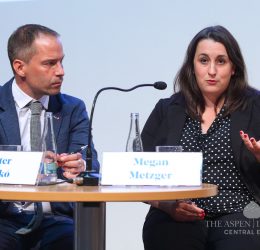Digital (Dis)Information Overload
A public debate „Digital (Dis)information Overload“ was held on September 24 in CEVRO Institute in Prague. The debate was prepared within the framework of the Aspen Initiative For Europe (AIFE) cooperation with Aspen Institute Germany, Aspen Institute España, and with kind support of CEVRO Institute, the US and Spanish Embassies.
The debate was opened by Ivan Hodáč, President of Aspen Institute Central Europe, and Martina Heranová, Head of Prague Centre for Transatlantic Relations of CEVRO Institute.
Beginning a fascinating public debate on Digital disInformation Overload with @alandete @meganmetzger @peterkreko Jaime Fly, organized by @AspenInstCE with @AspenSpain & @AspenGermany @CEVROinstitut pic.twitter.com/Ycp6aYbpI1
— Nika Prislan (@nprisl) September 24, 2019
David Alandete, ABC Daily Correspondent to the White House and the author of the book Fake News: The New Weapon of Mass Destruction, emphasized that there is a broader assault against the liberal media. He reminded that the media have been necessary in establishing and fostering democracy and pointed out that there is a worldwide attempt to discredit independent media in order to create an alternative reality and alternative truth distributed on disinformation platforms. He stressed that the authorities should clearly pinpoint and indicate who a journalist is and what is media. The authors from disinformation platforms should not have the same treatment and access as journalists and media.
Jamie Fly, President and CEO of RFE/RL, is convinced that governments should give a fundamental support to free, independent media and fact-based reporting. The broader problem is the lack of awareness about who founded the platform or who the author is or what is the source. He believes AI can provide some interesting tools that would help us in fighting against disinformation and non-transparent platforms.
Péter Krekó, Director of Political Capital Institute, claimed that a lot of politicians come to the conclusion that it is easier to win elections using fake news which work with emotions (fear, hatred, hope) rather than logical thinking. In his opinion the restrictive regulation of social media is not the best way. It is rather necessary to foster traditional forms of critical thinking within the education – fact checking should become a moral obligation. Technology doesn´t have an inherent morality – it is a human issue.
Megan Metzger, Research Scholar and Asocciate Director at the Global Digital Policy Incubator Programme at Standord University, is convinced that many problems we are dealing with now are new in form but not in content. The technological development brings both – positive impact (e.g. access to information) and negative effects (e.g. misinformation, manipulation). She doesn’t support an over-restrictive way of solution that would require to give up on freedom and rights. We need to think carefully about these complex issues making studies and testing potential consequences of offered solutions before moving forward, she said.
The debate was moderated by Michala Hergetová from Czech Television.































